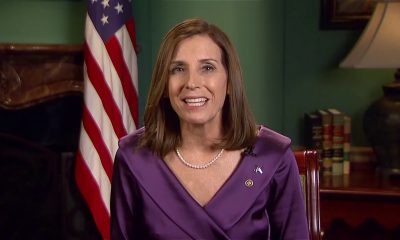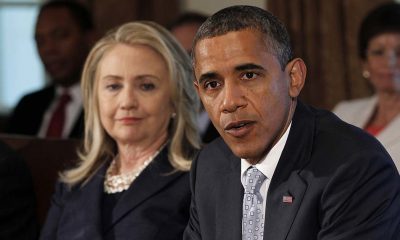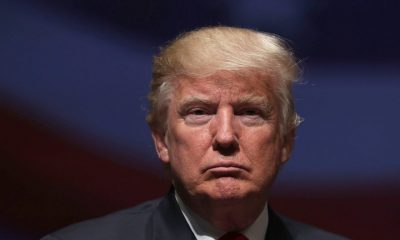World
Indian-Americans lose young scientist title; 5 in final

Washington: Indian-Americans failed to win the 2015 Discovery Education 3M Young Scientist Challenge even as five of them made it to the final ten in the competition to develop scientific plans to solve everyday problems.
The top prize of $25,000 and an “adventure trip” went to Hannah Herbst, 14, a Grade 8 student from of Boca Raton, Florida, at the finals Tuesday in St. Paul.Discovery Education 3M Young Scientist ChallengeDiscovery Education 3M Young Scientist Challenge
She developed an Ocean Energy Probe that aims to provide a stable power source and fresh water to developing countries around the globe by using untapped energy from ocean currents.
Last year 14-year-old Sahil Doshi, an Indian-American ninth grader from Pittsburgh, Pennsylvania was named America’s top young scientist for his innovative, eco-friendly battery design.
Among the five Indian-American finalists this year, Raghav Ganesh, 13, a 7th grader from San Jose, California has invented a device that predicts and prevents Autistic Meltdowns to help those with Autistic Spectrum Disorder and their caregivers.
Monitoring physiological and environmental factors that can cause and trigger stress, Raghav’s wireless and wearable machine alerts the wearer and caregiver when any stressors rise above a certain threshold.
His invention allows care to be tailored to individuals’ needs by recording all sensory data and therapeutic responses. Raghav hopes his invention can help many people in daily situations, catering to the Autistic population and their caregivers.
With a goal of preventing distractions while trying to concentrate, Amulya Garimella, 11, a Grade 6 student from Pittsburgh, Pennsylvania, has invented a distraction monitoring system that alerts the user of distraction by measuring EEG brainwaves.
When users get distracted, they will receive an alert reminding them to concentrate and get back to work. Amulya hopes that being distracted while doing homework or working will be a thing of the past!
Iris Gupta, 12, a sixth grader from North Potomac, Maryland, has invented a device to stop allergies at the source.
She believes that by inhaling or injecting nanoparticles, allergens’ ability to attach to antibodies present in one’s body would be blocked as they entered one’s systems.
Her invention aims to give people suffering from allergies some much needed relief by testing to find the correct amount of nanoparticles optimal for blocking allergens.
Krishna Reddy, 13, Grade 7, from Wichita Falls, Texas, has invented a device that finds other substances that a breathalyzer for alcohol consumption cannot detect.
Krishna created a pupillary reflex computer programme and apparatus that measures pupil dilation.
Many drugs influence the uncontrollable movement of pupil dilation, and by detecting drugs through dilation, Krishna hopes many more preventable accidents can be stopped.
Sanjana V. Shah, 13, a Grade 8 student from Cupertino, California, has created a programme to detect where cities may need more drains and where they may need to increase current drain pipe sizes to prepare for heavy rainfalls.
By using pipe network analysis modelled after city drain pipe maps, Sanjana can simulate heavy rainfall to see where possible flooding may occur.
National
Foodman Vishal Singh Honored for Hunger Free World Mission in Bangkok

Lucknow: Vishal Singh, a renowned social worker from Lucknow, also known as Foodman, has once again made India proud. He was honored by the Happy Hands Gloves Cooperative Limited Company in Korathai, Thailand, for his work with the Hunger Free World Mission.
The Hunger Free World Mission’s meeting was held in Korathai, Thailand, under Vishal Singh’s leadership. Representatives from several countries, including Mr. Raja Dwivedi (Managing Director of Happy Hands Gloves Limited), Thailand Coordinator Mr. Raja Mishra, and member Mr. Varun Singh, attended the event.

Under Vishal Singh’s leadership, the attendees took a pledge to work together toward creating a hunger-free world.
Speaking on the occasion, Vishal Singh explained that the main goal of the Hunger Free World Mission is social participation. He said the mission is not just about feeding people but also about meeting other basic needs of those who are struggling. The mission focuses on helping families of terminally ill patients in hospitals by providing food and shelter. It also works to fulfill essential needs like education, jobs, and care for the elderly.
For the last 16 years, the Vijay Sri Foundation has been providing free services, benefiting thousands of people. Vishal Singh highlighted that the mission aims to gain global recognition like other organizations such as WHO, WWF, and Red Cross, which work for social causes.
During this meeting, Vishal Singh was appointed as the Chairman of the Hunger Free World Mission by representatives from various countries. They also discussed holding regular meetings in different countries to push the mission forward.
Business tycoon Dr. Abhishek Verma has also supported this humanitarian mission, vowing to promote the idea of “Seva Parmo Dharma” (Service is the highest duty) worldwide. Vishal Singh praised him, stating that people like Dr .Abhishek Verma inspire others to work for the betterment of society.
Recently, Romania’s Ambassador, Mr . Daniela Sezonov Ţane, invited Vishal Singh to the Romanian Embassy in Delhi, where they discussed the mission in detail. Impressed by his humanitarian work, she honored Vishal Singh and invited him to Romania to take the mission forward .
Food man Vishal Singh has been serving the people of India for the past 16 years. Through the Vijay Sri Foundation, he provides free meals to cancer patients & their families ,shelter, and education for women & children along with running free old-age homes in Lucknow.
In addition to his humanitarian work, Vishal Singh also addresses issues like crime and corruption through his role as Chairman of Seva Path Media and Managing Director of Vijay Sri Foundation.

During the COVID-19 pandemic, Vishal Singh and his team worked tirelessly to provide food and help to the needy, including starving children, elderly citizens, and pregnant women. Despite contracting the virus himself, he continued to assist others after his recovery. He even created a life-saving oxygen regulator using household items, which was praised by doctors both in India and abroad.
In his address at the meeting, Vishal Singh spoke about his mission to create a hunger-free world. He pointed out that India’s large population, along with issues like unemployment and poverty, has caused the country to fall on the Hunger Index. He urged people to contribute just one handful of grains daily to help create a hunger-free world.
He concluded by saying that through social participation, we can empower the people around us, meet their basic needs, and work together to build a stronger, more prosperous, and developed society.























